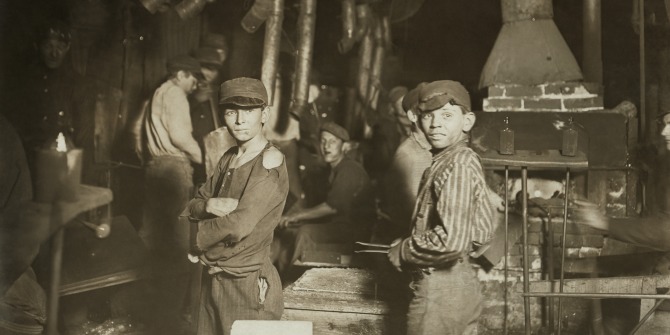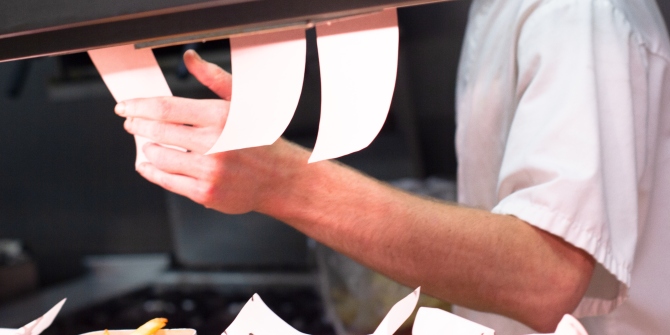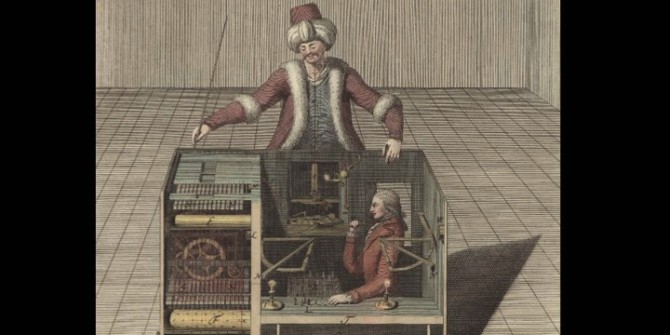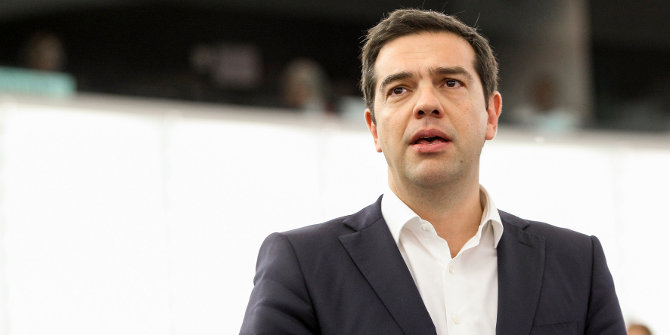
 With bailouts for Big Finance and tax-sheltered corporations, Inderjeet Parmar and Atul Shah write that working people are paying the costs of the crisis. They comment that the pandemic presents an opportunity to rethink social and economic policies and our relationship with markets, corporations and capitalist institutions.
With bailouts for Big Finance and tax-sheltered corporations, Inderjeet Parmar and Atul Shah write that working people are paying the costs of the crisis. They comment that the pandemic presents an opportunity to rethink social and economic policies and our relationship with markets, corporations and capitalist institutions.
The global pandemic is bringing working people to their knees, and on to their feet, all over the world as “markets” receive trillions in bailouts. The coronavirus pandemic is a natural phenomenon, but the responses to it are far from inevitable.
They are driven by the interests of the most powerful, the kingpins of Big Finance, those anonymous “markets”. Their levels of “confidence” are the stuff of daily headlines, of handwringing by central banks and government treasuries who want to boost “market confidence”.
Big Finance buys and sells not to invest in businesses making tangible products and creating employment but purely for the joy, and compulsion, of “making money”. Even productive investment has now been replaced by rentier wealth extraction.
The struggle ahead on a shifting political terrain
Nothing is inevitable in politics. It is a power struggle between rival forces and ideas. And right now, the pro-corporate do-nothing laissez-faire neo-liberals are on the ropes. As the economist Paul Mason argued in the New Statesman recently, nothing in the history of modern neo-liberalism has quite prepared our leaders for the current crisis. So they lurch from one inaction to the next, unprepared to act because their philosophy is that markets act, having gutted the public sector through austerity.
The COVID-19 pandemic is certainly unprecedented but, according to a recent Panorama investigation, it was not unexpected – the British, American and other governments have long known that a global pandemic was the biggest single threat to their peoples.
In September 2019, President Trump’s own Council of Economic Advisers reported to the White House that a global pandemic would find the US healthcare system woefully unprepared. The report was ignored as Trump continued his far-right ‘deconstruction of the American state’, as recommended by his erstwhile alt-right (i.e., fascistic) chief strategist, Steve Bannon.
Exercise Cygnus by the British government in 2016 – a study that remains buried – also indicated, according to reliable sources close to the matter, that the destruction of 20,000 beds and a 40,000 shortage of nurses had left the country vulnerable in the event of a pandemic.
On the other hand, the emergence of state spending on a scale unprecedented for decades to keep the economy going, to fund 80 percent of UK locked-down workers’ salaries, the widely-acclaimed hero status of key workers, the number of public petitions calling for the government to act to financially and in other ways assist health workers, and growing hostility to corporate bailouts, has changed the very terrain of modern politics.
Wildcat strikes – at least 140 in the US alone – have broken out across the world as workers challenge their employers’ refusal to guarantee their safety. The state is now the saviour, not the enemy. The question on so many UK voters’ lips ahead of the UK election in December 2019 – “who’s going to pay for [former Labour leader Jeremy] Corbyn’s spending promises?” has been jettisoned by sheer necessity. The basic philosophy of Corbynism – or its pragmatically-necessary outer forms – has been catapulted to the fore.
Pandemic capitalism – not business as usual but pretty close
But for now, neoliberal leaders are already showing how they aim to channel funds in vastly unequal ways, and via their traditional financial allies. Even in this extraordinary time of crisis, established leaders are trying to hold onto and strengthen all the vestiges of neoliberalism and the financial corporations on which their strategy, and class loyalties, rest. A leaked UK Treasury paper suggested that the government is already planning freezing public sector pay, rises in regressive taxes that hit the lower paid the hardest. That is, those very ‘key workers’ applauded by millions every Thursday evening are to be the ones to pay for the financial costs of the pandemic.
Therefore, as millions line up before unemployment offices and food banks, or deliver food and supplies, or work in hospitals and care homes with inadequate protective equipment, trillions of pounds and dollars are making their way in invisible transfers. That’s transfers of trillions from working people to financial speculators who bet on stock, currency and bond market movements, who manipulate markets to profit regardless of the cost to the public or real investors. In this grotesque process, huge quantities of borrowed funds are used which, when payment is due, are largely paid by governments to avoid a stock market meltdown.
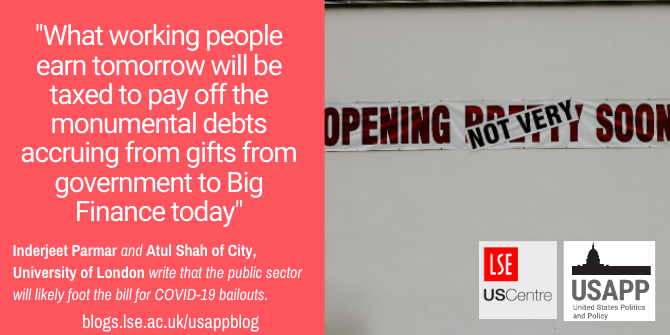
Photo by Makenna Entrikin on Unsplash
We read a great deal about government pay-outs to businesses employing millions, the result of massive popular pressure to force the hand of the state. And the costs of that are debated openly.
We read a lot less about how governments are selling the future of taxpayers to underwrite the markets and the speculators who drive them not because they have anything much to do with the “real” economy, but because Big Finance and government have virtually fused over the past half-century. In his book The Establishment: And how they get away with it, Owen Jones has shown how the revolving door between the treasury and the City of London works to the mutual advantage of political and financial elites but at the expense of taxpayers. They have jointly reconfigured the political economy to snuff out the countervailing power of organized labor and their hard-won welfare state, and create a finance-driven system that squeezes great profits and transfers income and wealth from the bottom to the super-rich.
The primordial greed at the heart of the modern neoliberal corporation, however, knows no bounds. They are lining up for bailout funds from treasuries to which they contribute so little. Multinational corporations have mastered the art of tax avoidance and arbitrage with the help of the global ‘Big 4’ accounting firms. The art of wealth extraction has also focused on minimizing tax payments to governments, by following the letter of the law, but breaking its spirit. They actively use offshore tax havens, and force governments to compete with one another on the highest level of tax subsidies they can provide.
One estimate puts this annual tax loss by governments at $700 billion – a sum higher than the GNP of many countries. So whilst corporations rely on taxpayer-funded infrastructures like education, road, rail, law & order, energy – vitally essential to efficient management, they are not willing to pay their fair share for the government cost of providing these services. They see tax as an expense rather than a repayment to the government of their rightful stake in the public company. And, economic and financial experts for a long time have not only promoted this logic, but endorsed it as a really smart way to run an efficient business.
Furthermore, if we look at the banknote in our pocket, it has the seal of government on it. In truth, money creation and circulation have become highly privatized and outside the control of the government. We have been living a myth that it is the state which controls the money supply.
Both Goldman Sachs and Blackrock are big advisers to the government over financial affairs, and have a major tacit influence on the issuance of bonds and the levels of interest rates – even though they are privately owned financial institutions. In a crisis like COVID-19, we once again become beholden to such institutions. But, in truth, the line between the ‘state’ and the ‘private’ sector hardly applies. The capitalist state and finance are Siamese twins.
Real economy neglected
At the same time, taxpayer funds to small and medium-sized businesses are either inadequate or too slow and cumbersome, leaving many to go under – over 30 American million workers have already lost their jobs. The inadequacy of the US Paycheck Protection Program is a case in point. In March, less than 30 percent of the unemployed had received any benefits. Millions faced long delays in receiving the $1200 cash payment promised by the federal government. Over 9 million workers lost health insurance along with their jobs; millions more follow in their train. And small businesses face financial ruin.
Meanwhile, President Trump leads a far-right program of denial and demands to re-open the economy and send people to work in life-threatening conditions, despite medical advice. The elite-orchestrated right-wing campaign to “liberate Michigan” and other states from social distancing and lockdown measures is driven by the dread of making state payments to workers who have fallen upon hard times due to the global pandemic. But to the powers that be, a rising death toll matters little because the “markets” are rising alongside the body count.
Why? Because the Federal Reserve has promised for months to underwrite market losses – first with a zero interest rate to encourage cost-free borrowing for speculation. This was followed by a cast-iron guarantee to back Wall Street – hence the markets keep rising because the risk is underwritten by the bottomless pit of taxpayer money. The CARES Act allotted over $450 billion to fund asset purchases of $4 trillion. At the rate at which the Federal Reserve is buying, its asset-holdings may shortly equal $11 trillion – almost half the total US annual economic output.
Bills and benefits – a zero-sum game
The benefits go to those who own the vast majority of stocks and shares – the already super-rich. This is corporate welfare on an unprecedented scale.
Guess who foots the bill for the bailouts? The public sector – the dirtiest word, like the state, in the era of neoliberal corporate power. What working people earn tomorrow will be taxed to pay off the monumental debts accruing from gifts from government to Big Finance today. This is what is going to blow out the public sector balance sheet, this is what we, the people, in whose name the “market must be protected” are going to finance.
The coming struggle
UK Labour MP Tony Lloyd on leaving the hospital after life-saving treatment for the coronavirus said, “What it’s done is focused…my long-term belief that our society is disordered. If this pandemic doesn’t make us rethink what kind of world we want to live in then I’m not sure what will. We will have to use this experience as the anvil on which we beat out this new world.”
Contrast that with the warning from the Koch-backed American Legislative Exchange Council’s (ALEC) Chief Economist, Jonathan Williams: “I think we all know how times of crises like these can be very dangerous times for those of us who believe in the ALEC principles of free markets and limited government and federalism.”
It is crystal clear that there is an impending power struggle ahead. Popular vigilance and organized leadership will be required to frame policies for economic and social reconstruction, to boost the economy, for small businesses and workers, within the context of necessary international cooperation, and against America-First and narrowly-nationalist right-wing populism. There is no room for xenophobia.
Those failed strategies have led us to the current disaster.
- A version of this article first appeared at The Wire.
Please read our comments policy before commenting.
Note: This article gives the views of the author, and not the position of USAPP– American Politics and Policy, nor of the London School of Economics.
Shortened URL for this post: https://bit.ly/3bAmxfq
About the authors
Inderjeet Parmar – City, University  of London
of London
Inderjeet Parmar is professor of international politics at City, University of London, a visiting professor at LSE IDEAS (the LSE’s foreign policy think tank), and visiting fellow at the Rothermere American Institute at the University of Oxford. He is a columnist at The Wire.
 Atul Shah – City, University of London
Atul Shah – City, University of London
Professor Atul Shah is an honorary research fellow in the department of international politics at City, University of London. He tweets @Atulkshah


